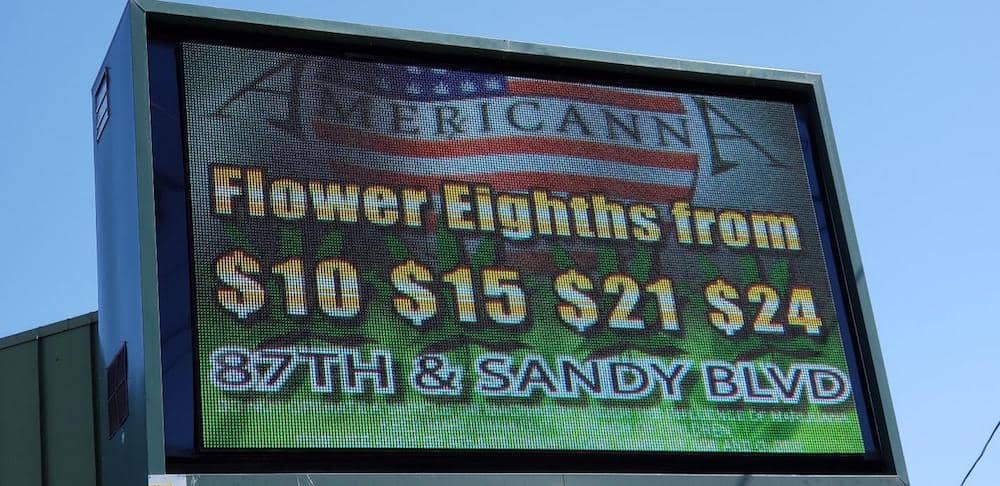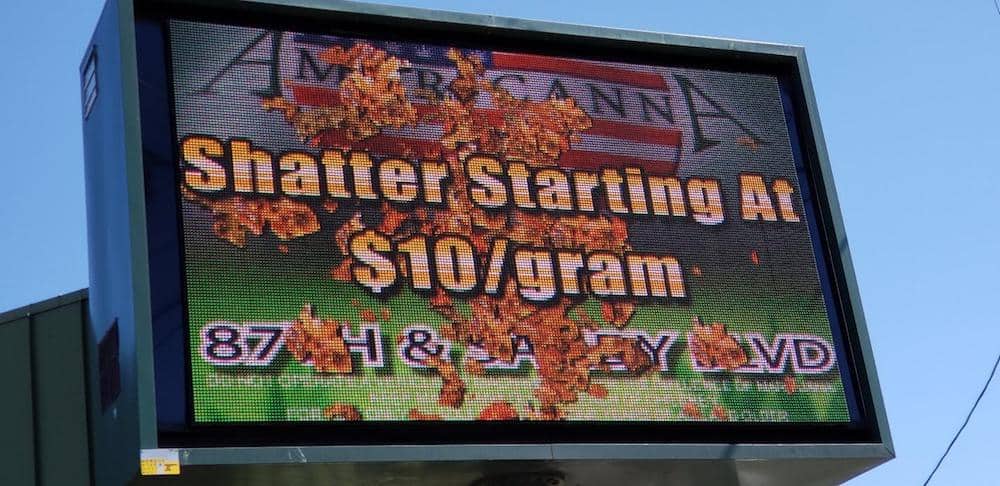When legal recreational marijuana sales began in the Pacific Northwest in 2014, prices were as high as $30 per gram for flower.
“My hope is on my home state of Oregon to ramp up production and bottom-out prices,” I wrote for High Times. “I want to see a $50 legal ounce before 2020, dammit!”
That is exactly what has happened. The picture above is a billboard on the boulevard near my home, Delta-9 House & Studios, here in Portland, Oregon.
You read that right. $5 per eighth – not $5 per gram. We’re talking about a store where you may walk in and purchase a $40 ounce of Oregon-grown cannabis flower.

Just eight blocks from my home, there is an electronic billboard for another cannabis shop. It is advertising flower starting at $10 per eighth, up to $24 per eighth.
So, even the top-shelf flower here is coming in at $192 per ounce.
Keep in mind, these are prices that are including 20 percent in taxes. That means the $5 eighth is actually priced three cents less than $4.20.

The crashing flower prices also mean cheaper concentrates. That same electronic billboard is advertising shatter starting at $10 per gram.
The crashing price is due to factors you may have learned in Economics 101 – supply and demand.
According to an article in the Bend Bulletin, the state’s cannabis regulatory agency says it has logged over one million pounds of flower grown by licensed growers.
That’s five ounces of weed for every adult in the state. A little over 100,000 pounds were sold in the state’s licensed shops in 2017, so there are about 900,000 pounds of legal pot waiting to be sold or processed into concentrates and edibles.
Why so much? Oregon, unlike other legal states, set no limits on the number of producer licenses or the statewide-aggregate canopy space growers may produce.
“Our agency doesn’t have the authority to limit the number of licenses,” says Oregon Liquor Control Commission spokesman Mark Pettinger. “It’s the responsibility or authority of the Legislature.”
Oregon also makes it easy to get in the business of growing weed. The producer license fee starts at just $1,000 at the “Micro Tier I” level (625 sq. ft. indoors / 2,500 sq. ft. outdoors) and the largest “Tier II” license (10,000 sq. ft. indoors / 40,000 sq. ft. outdoors) only costs $5,750.
“There weren’t a whole lot of barriers to entry,” explained Beau Whitney, senior economist for New Frontier Data, in Willamette Week. “The OLCC basically issued a license to anyone who qualified.”
This led to now over 1,000 licensed growers all in a fierce competition to sell their crop.
“With outdoor flower, you’re seeing $300 to $600 pounds; for indoor, between $600 to $1,600,” says Lindsey Rinehart, a sales rep with Hoodview Cannabis Distribution, one of the state’s licensed wholesalers.
The flood of product here has also caused an economic upheaval, both for legal operators who sunk thousands into new businesses that are struggling to survive and for the underground growers who must undercut the legal price to stay in business.
Rinehart thinks the growers are slowly adapting to the new economy.
“Across the board we’re hearing producers are reducing planting or haven’t planted,” she says. “Down in Southern Oregon we’re seeing less pots and less plots, when they would’ve been planted by now in years before.”
Cannabis consumers, however, are wondering how low prices can go? Since we beat my $50-ounce deadline by two years, should we dare to dream of the $20-ounce by 2020?














